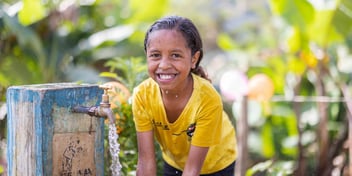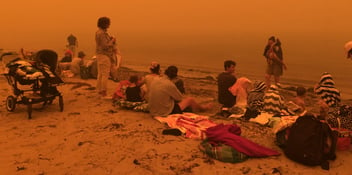WASH project empowers women in Fiji
%20(1).jpg)
This year’s World Water Day (22 March) is dedicated to accelerating change to solve the global water and sanitation crisis, and one collaborative Water for Women project showcases how sharing insights and learnings can help to better inform and speed up positive transformation.
The Australian Government Water for Women Fund is about supporting improved health, equality and wellbeing in Asian and Pacific communities through socially inclusive, sustainable and climate-resilient water, sanitation and hygiene (WASH) projects.
Over the past five years, Water for Women has partnered with Habitat for Humanity Australia (Habitat Australia) to work with 18 communities across the Ra and Ba Provinces in Fiji with the aim of strengthening community resilience and inclusion through improved WASH services.
While women are the biggest users of water in Fiji, given their traditional roles in caring for children and preparing food, they had very little influence on the communities’ WASH systems, because of their low representation on WASH committees.
Habitat Australia CEO Nicole Stanmore said one of the key aims of the Water for Women project in Fiji was to empower women to ensure they had a voice in decision-making with respect to WASH in their community.
“We wanted to increase female representation, which is very important in the water context because women are the predominant users of water in the community,” she said.
“We also want to achieve behavioural change, and that’s the case across all of our projects. It's no use supporting infrastructure development if people are not in a position to maintain it. When it comes to development, it’s crucial to empower the community to take ownership.”
Learning together
The project received $3.5 million in funding from DFAT, with funds managed through the International Development team in GHD in its role as the Water for Women Fund Coordinator.
The Fund Manager, Alison Baker, said the aim of the program is to contribute to lasting and deeper change.
“GHD has been working in the water and sanitation sector for a long time. It’s an extension of a lot of the work that we traditionally do in the sector to create lasting community benefits,” she said.
“The role we played in the Water for Women project in Fiji was about collaborating with our partner, Habitat for Humanity Australia, by offering technical support from around the development sector and facilitating knowledge sharing and cross-fund learning from across the region.”
Baker said the Water for Women Fund considers WASH as an entry point for transforming gender and social norms, and implementing targeted strategies. In its role as fund coordinator, GHD supported all fund partners in their commitment to transformative change for individuals, communities and systems.
“Our CSO and research partners obviously have a lot of expertise. We want to harness all of that experience and insight, identify common learnings and do the analysis required to learn faster, and better, about what we are doing,” she said.
“All the partners in Water for Women have unique insights to bring to this work. And GHD, as the contract manager for the fund, has the privilege of being able to see right across all the different projects.
“This enables us to see where one project's insights might be useful somewhere else, and helps us to create opportunities for more learning and sharing.”
Do no harm
Given that some communities in Fiji adhere to traditional gender roles, working through WASH solutions with a gendered and social inclusion lens proposed challenges, Stanmore said.
“You go in with all these ideas about gender empowerment, but we know that there can be backlash. We want to ensure the project doesn’t negatively impact women,” she said.
Baker said GHD supported the implementation of a “do no harm” strategy with Habitat Australia, using a toolkit provided by the International Women’s Development Agency (IWDA).
“IWDA developed a toolkit for supporting women’s economic empowerment in ways that do no harm and using approaches in contextually appropriate ways. This toolkit was informed by extensive research in the Pacific context. We suggested that the toolkit be trialed in Fiji, to see how we might be able to adapt it to the WASH sector specifically,” she said.
“And we all learned a lot through that process. Communities are not homogenous and it’s important for us to work to ensure these tools are adapted to context.”
Stanmore said Habitat Australia conducted a “do no harm” workshop to understand what the perceptions were in the community around gender empowerment to ensure that whatever changes were implemented weren’t going to create backlash for women.
“One of the exercises put men and women together to discuss what they did during the day, and then they role play. That was a huge eye opener for the men in the community because they hadn’t realised how busy the women’s traditional roles were,” she said.
“But when it came to empowering the women in these communities, the first challenge was to work with the perceptions of the team themselves. We worked with the Habitat for Humanity Fiji office, and the team there are local Fijian men and women.
“The young woman managing the project at the time said she was really challenged to change her own perceptions of the role of women. She understood that she couldn’t go to the community until she understood her role in making these changes.
“Our manager recognised she needed to acknowledge the agency she had as a woman before she could go to the community and ask the women to have a voice themselves.”
Community first
Habitat Australia worked with WASH committees in Ra and Ba provinces to engage in community consultation about their priorities for infrastructure improvements and where they wanted to see the funding invested.
“We don’t come in with the attitude that we know the answers, because we don’t. We are always working with very intelligent people who understand their own context and we need to listen. It’s a partnership approach,” she said.
And, following consultation, WASH facilities at schools were identified as a big issue.
“The community informed us that schools in Fiji have a big need for improvement in WASH facilities, and girls didn’t have private facilities, either. So one of the things we focused on in the project was menstrual hygiene facilities,” she said.
“And it has worked. Ensuring girls have their own private facilities at schools in Fiji has brought down the amount of absenteeism at the schools.
“It also enabled discussion within the community about menstrual health, accepting menstruation as a normal part of life and why it’s important to get past the stigma, for the wellbeing and health of girls and the broader community.”
Stanmore said COVID-19, as well as a series of destructive cyclones, definitely created some issues for delivery, but, with some complementary funding provided by the SMEC Foundation, all the infrastructure required in the communities was completed successfully.
“We needed more funds to do everything we wanted, which is why we are super thankful also to SMEC, who funded us to help an additional three schools, and deliver more infrastructure,” she said.
The SMEC Foundation funding directly supported the delivery of WASH infrastructure for three of the schools in the region, including rainwater tanks, ceramic water filters, taps, toilets and menstrual hygiene facilities.
SMEC Foundation Chair Roger Bayliss said the foundation is committed to uplifting communities through development and poverty reduction, an aim that aligns well with Habitat Australia’s mission to build sustainable communities through safe facilities.
“We acknowledge the long-standing partnership with Habitat Australia and are delighted that, together, we could deliver the Water for Women project in Fiji,” he said.
The Water for Women project in Fiji helped over 980 households, with a total population of 5021 in 18 communities, and 1140 children and 69 teachers in 11 primary schools across Ra Province and Ba Province.
Prior to the project, only 21% of the overall water committee membership was women, and six of the 18 water committees had no representation of women at all. The female representation on the committees across the 18 project communities is now up to 41%, and all the committees now have at least one female committee member.
Makareta, one of the teachers at the same school she attended as child, said the changes the Water for Women project has helped the community achieve is incredibly important.
“When I was in primary school at this school, we didn’t have clean water. We had to get clean water from the village,” she said.
“We only had two concrete water tanks at our school and, looking back now, the water was not safe for children to drink. [The project helped] us rebuild this school with the greatest gift: water.”


